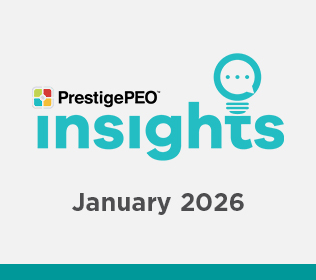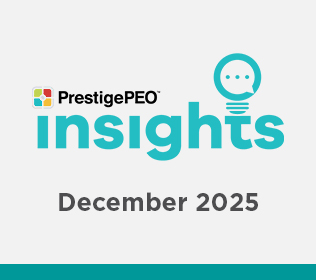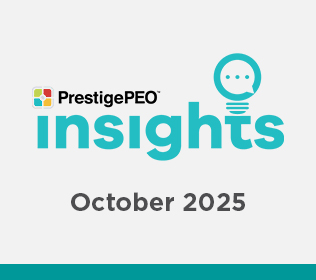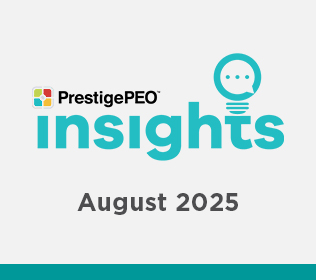
The latest news relevant to you and your business


Your Contributions Are Due Tomorrow – September 24, 2025!
We hope your Open Enrollment experience this year has been smooth and that you’ve created the best contribution models for your business. Just a friendly reminder: all contributions must be submitted by Wednesday, September 24, 2025. Timely updates ensure your employees have plenty of time to review their options and make elections in their PrestigePRO Employee Benefits Portal.
If you need assistance, our PrestigePEO team is here to help. Contact your dedicated Benefits Specialist or Benefits Account Manager or call our Benefits Team at 833-PEO-BEN1.
You can also visit our Open Enrollment Resource Center for a guided Renewal Portal tour and step-by-step instructions. We’re excited to build on this Open Enrollment season’s success and look forward to our continued partnership.

Staying Ahead of Compliance, Together
Regulations evolve quickly, but with PrestigePEO, you’ll always be prepared. This month’s compliance updates highlight the latest changes impacting employers and provide guidance to stay compliant, safeguard your workforce, and plan confidently for what’s ahead.
- A Closer Look into the Big Beautiful Bill and No Tax on Tips
- ADA Accommodation Requests – Indefinite Leave and Remote Work
- Additional Local and State Updates for September and October 2025
- Colorado Delays AI Act What Employers Need to Know Before June 2026
- Colorado Employment Laws Big Changes Ahead for Employers
- EEOC Raises the Bar on Religious Accommodation Compliance
- Evolving Child Labor Laws Across US States
- Expanded Workers’ Compensation Coverage for Mental Health Injuries in New York
- Florida Minimum Wage Increases Again
- Florida Reminder Re-Everify
- Illinois Expects Heavy EPRC Renewal Period
- Illinois Nursing Mothers in the Workplace Act Updates
- Louisiana Employment Discrimination Law Updates
- Louisiana Wage Payment Act Updates
- New Colorado Wage Rules are in Effect – Steeper Penalties Ahead
- New Retirement Savings Program Has Launched for Nevada Private Sector Employees
- Pay Transparency Laws Continue to Expand
- Stronger Labor Protections on the Horizon for New Jersey Cannabis Workers
- Texas Codifies Binary Sex Classifications Under House Bill 229
To learn more about previous compliance updates, visit the Client Resource Center, select “managers,” and click the Compliance section.

In Case You Missed It: Navigating Tough Workplace Dynamics
Managing Difficult Employees with Confidence
Our HR leaders, Elisabeth Shaw (Chief HR Officer) and Dee Hutcherson (VP of HR), recently led an impactful session on Navigating Tough Workplace Dynamics: Strategies for Managing Difficult Employees.
From uncovering the root causes of challenging behaviors to documenting issues and knowing when termination may be necessary, this session delivered practical tools and expert guidance to help managers lead with clarity, professionalism, and empathy.
Watch the on-demand recording to learn proven strategies for building a stronger, healthier workplace culture
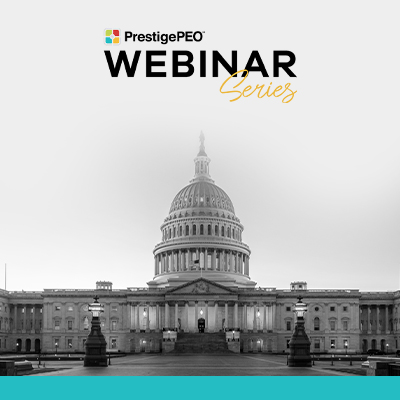
What Employers Need to Know About the One Big Beautiful Bill Act
In Case You Missed It: Key Takeaways from the OBBB Act Webinar
You may have missed What Employers Need to Know About the One Big Beautiful Bill Act, but you’ve still got the opportunity to catch up. Our experts (Elisabeth Shaw, Abbey Kuczynski, Stacie Alvaro) dove into how the OBBB Act impacts tax deductions, HSAs, Dependent Care FSAs, and more.
Watch the on-demand recording now to stay ahead of compliance changes and confidently prepare your business.
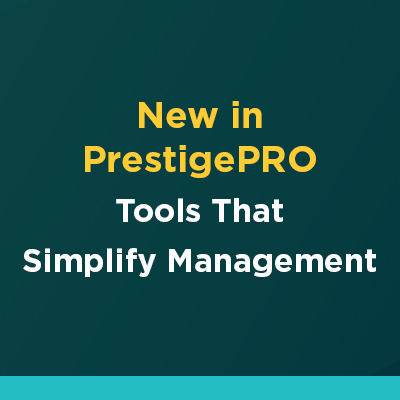
New in PrestigePRO: Tools That Simplify Management
Two Enhancements to Streamline Your Workday
We’re excited to introduce two new PrestigePRO features that make managing people and processes easier than ever:
PTO Calendar Integration: Managers can now subscribe to their team’s PTO calendar and view schedules directly in Outlook, Google, or any .ics-compatible tool.
This gives you a clear snapshot of availability, without needing to log into the portal each time. You can access this User Guide to learn how to integrate this within your organization.
Manager Access by Hierarchy: A new security option lets administrators tailor manager access by role, from direct reports only to the full reporting hierarchy. This ensures the right level of visibility and oversight.
These updates are part of our ongoing commitment to enhance PrestigePRO with intuitive tools that save time and simplify management.
For further guidance or support regarding both these enhancements, please contact your HR Business Partner.
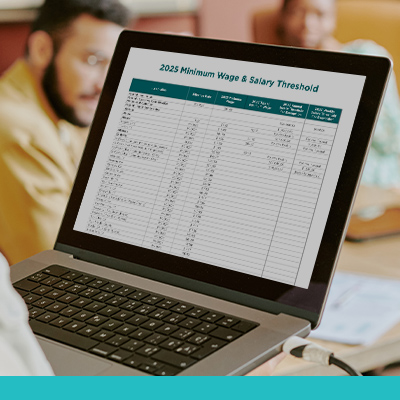
2025 Florida Minimum Wage Updates
Prepare for New Rates Effective September 30
Florida’s minimum wage requirements will change as of September 30, 2025. Employers may need to adjust pay rates to remain compliant.
PrestigePEO is here to make the process easier. We’ve compiled the updated requirements by state and locality for your review.
Review the latest document to confirm any adjustments needed for your workforce. If you have questions, please contact your assigned PrestigePEO Payroll Specialist.

Payroll Funding Company is Now “Ready to Fund”
We’re excited to share that our trusted partner, Payroll Funding Company, has officially rebranded to Ready to Fund. While the name has changed, their commitment to providing reliable funding solutions for your business remains the same.
Through Ready to Fund, PrestigePEO clients can continue to access flexible credit line and funding solutions designed to support growth, stability, and peace of mind.
For more details and resources, visit the updated co-branded client landing page below.

A Powerful New Benefit for Your Employees
Introducing BenExtend from Aflac
PrestigePEO is proud to bring you BenExtend, a new voluntary benefit from Aflac that combines the protection of accident, critical illness, and hospital indemnity coverage into one streamlined solution.
With BenExtend, your employees gain financial peace of mind with coverage for hospital stays, ER visits, fractures, cancer, heart attack, and more—all at no cost to them*.
For employers, it’s a simple way to enhance your benefits portfolio, improve employee satisfaction, and strengthen retention without adding administrative complexity.
Know a company that would thrive with stronger HR support, richer employee benefits, and proven compliance expertise? Introduce them to PrestigePEO; you could earn up to $2,500 for every successful referral.
There’s no limit; refer to as many businesses as you’d like and get rewarded each time. Helping your network grow while boosting your bottom line has never been this easy.

Staying Ahead of Compliance, Together
Regulations evolve quickly, but with PrestigePEO, you’ll always be prepared. This month’s compliance updates highlight the latest changes impacting employers and provide guidance to stay compliant, safeguard your workforce, and plan confidently for what’s ahead.
A Closer Look into the Big Beautiful Bill and No Tax on Tips
The “Big Beautiful Bill” was signed into law on July 4th by President Trump and notably included a provision to allow for certain workers to deduct significant portions of their tips and overtime income from federal taxes starting with the 2025 tax year. Upon its passage, the Big Beautiful Bill did not provide substantial guidance on what industries would be eligible for these deductions, but on September 1st a list was released by Axios from the Trump Administration that outlines the industries and occupations that would be eligible.
To summarize the language of the bill briefly, the “no tax on tips” provision includes that:
- Individuals must earn $150,000 or less in 2025 to be eligible; for couples, the combined income limit is $300,000 (this threshold will be adjusted for inflation in future years);
- Only cash tips (including those charged and those received under tip-sharing) and tips reported to employers for payroll tax purposes are eligible;
- The maximum deduction for tip income is $25,000 per year;
and
- Exemptions will only apply from TY2025 to TY2028 and will need to be extended by Congress to continue.
The list published by Axios comes from the Treasury Department that was ordered to publish a comprehensive list of the eligible occupations by October 2nd. From this list, there are 8 separate categories, and 68 job titles outlined. The full list has been provided below.
- Beverage and Food Service
- Bartenders
- Wait Staff
- Food Servers (non-restaurant)
- Dining Room and Cafeteria Attendants and Bartender Helpers
- Chefs and Cooks
- Food Preparation Workers
- Fast Food and Counter Workers
- Dishwashers
- Host Staff, Restaurant, Lounge, and Coffee Shop
- Bakers
- Entertainment and Events
- Gambling Dealers
- Gambling Change Persons and Booth Cashiers
- Gambling Cage Workers
- Gambling and Sports Book Writers and Runners
- Dancers
- Musicians and Singers
- Disc Jockeys (except radio)
- Entertainers and Performers
- Digital Content Creators
- Ushers, Lobby Attendants, and Ticket Takers
- Locker Room, Coatroom, and Dressing Room Attendants
- Hospitality And Guest Services
- Baggage Porters and Bellhops
- Concierges
- Hotel, Motel, and Resort Desk Clerks
- Maids and Housekeeping Cleaners
- Home Services
- Home Maintenance and Repair Workers
- Home Landscaping and Groundskeeping Workers
- Home Electricians
- Home Plumbers
- Home Heating/Air Conditioning Mechanics and Installers
- Home Appliance Installers and Repairers
- Home Cleaning Service Workers
- Locksmiths
- Roadside Assistance Workers
- Personal Services
- Personal Care and Service Workers
- Private Event Planners
- Private Event and Portrait Photographers
- Private Event Videographers
- Event Officiants
- Pet Caretakers
- Tutors
- Nannies and Babysitters
- Personal Appearance and Wellness
- Skincare Specialists
- Massage Therapists
- Barbers, Hairdressers, Hairstylists, and Cosmetologists
- Shampooers
- Manicurists and Pedicurists
- Eyebrow Threading and Waxing Technicians
- Makeup Artists
- Exercise Trainers and Group Fitness Instructors
- Tattoo Artists and Piercers
- Tailors
- Shoe and Leather Workers and Repairers
- Recreation and Instruction
- Golf Caddies
- Self-Enrichment Teachers
- Recreational and Tour Pilots
- Tour Guides and Escorts
- Travel Guides
- Sports and Recreation Instructors
- Transportation and Delivery
- Parking and Valet Attendants
- Taxi and Rideshare Drivers and Chauffeurs
- Shuttle Drivers
- Goods Delivery People
- Personal Vehicle and Equipment Cleaners
- Private and Charter Bus Drivers
- Water Taxi Operators and Charter Boat Workers
- Rickshaw, Pedicab, and Carriage Drivers
- Home Movers
What to expect next?
Employers and employees should be on the lookout for an official release of the list of occupations covered from the Treasury Department on October 2nd as there may be slight changes to the composition of the list and additional guidance will most likely be provided. Following the publication on October 2nd, the Treasury Department will publish the list and guidance to the Federal Registry before the 2025 tax filing deadline. Employers in these industries should prepare staff and management for these changes and should adjust payrolls to ensure accurate tracking and separate reporting of cash and shared tips on individual W-2s.
As always, PrestigePEO is here to help with payroll and compliance needs. For questions regarding these new regulations or other matters, please contact your HRBP for assistance.
ADA Accommodation Requests: Indefinite Leave and Remote Work
Employers are noticing increased requests for indefinite leave and full-time remote work under the ADA. Recent court rulings offer important insights into these matters. In Coffman v. Nexstar Media (4th Cir. July 2025), the court concluded that employers are not obligated to provide open-ended leave. If an employee is unable to provide a clearly defined return date, keeping the job open indefinitely does not meet the criteria for a reasonable accommodation. This ruling is applicable in Maryland, Virginia, West Virginia, North Carolina, and South Carolina, and may influence decisions in other regions as well.
Additionally, requests for remote work should be carefully evaluated. The Connecticut appellate court’s decision in Castelino v. Whitman, Breed, Abbott & Morgan, LLC (Conn. App. Ct. July 2025) established that employers are not required to allow full-time remote work if the job entails essential in-person tasks, such as managing physical documents or interacting directly with clients. This ruling is binding in Connecticut and could serve as a reference for other jurisdictions. Employers should evaluate each request individually, taking into account their operational requirements.
Employers operating in multiple states should recognize that some states, including California, New York, and New Jersey, have more favorable regulations for employees. Even if federal or specific state laws restrict indefinite leave or remote work options, local rules may require a more detailed review. A systematic and well-documented approach is essential for supporting employees, ensuring legal compliance, and maintaining efficient operations.
Employers must engage in the interactive process, which involves maintaining open lines of communication with employees, requesting updated medical documentation as needed, considering reasonable accommodations, and keeping detailed records. Remember, short-term disability benefits do not substitute for this process.
PrestigePEO is here to help your business maintain compliance. Contact your HR Business Partner with any questions.
Additional Local and State Updates for September and October 2025:
- City of Minneapolis: New Civil Rights Ordinance amendments, effective August 1, 2025, will prohibit Minneapolis employers from discriminating on the basis these new, additional protected classes, including height and weight, housing status, & criminal history.
- Arkansas: Medical Professional Non-Compete Ban, effective August 5, 2025, voids non-compete covenants that restrict the right of a physician to practice within the physician’s scope of practice.
- Arkansas: Amends Hiring Practices legislation, effective August 5, 2025, to allow an employer to disclose, upon written consent from a former or current employee, information regarding substantiated allegations of sexual abuse or sexual harassment by that employee, and/or the resignation of the former employee during a pending investigation of sexual abuse or sexual harassment, to prospective employers.
- Colorado: Healthcare non-compete law, effective August 6, 2025, prohibits employers from entering into non-competes with employees who practice medicine, advanced practice registered nursing, and dentistry.
- Illinois: Military Leave Act, effective August 1, 2025, will require employers with 51 or more employees to provide up to 8 hours per month, up to 40 hours per year, to participate in funeral honors detail for a veteran’s funeral.
- Maine: Paid Sick Leave amendments take effect September 24, 2025, requiring employers to allow employees to carry over up to 40 hours of unused paid sick leave to the following year while still allowing them to accrue up to 40 hours in that same year.
- Maine: A new wage and hour law effective September 24, 2025, will require employers with at least 10 employees to pay those employees who report to work but have their shift canceled or reduced by the employers the lesser of either 1) two hours of pay at their regular hourly rate OR 2) the total pay for the shift for which they were scheduled.
- Minnesota: Debt Fairness Act, effective August 1, 2025, prohibits employers from discharging or otherwise disciplining independent contractors based on wage garnishments.
- Nebraska: Healthy Families and Workplaces Act notice requirements take effect September 15, 2025, requiring employers to provide written notice of the Act.
- Oregon: Age discrimination in hiring amendment effective September 26, 2025, prohibits employers from asking job applicants to disclose their age, date of birth, or when they graduated/attended an educational institute before making a conditional offer of employment.
- Ohio: WARN Act notice for mass layoffs and plant closing effective September 29, 2025, requires employers with 100 or more employees who work collective total hours of at least 4,000 hours a week to provide 60 days’ notice before a plant closing or mass layoff to all impacted employees, and others as required.
- Texas: Trey’s Law, effective September 1, 2025, prohibits nondisclosure or confidentiality agreements and provisions that prohibit a person from disclosing an act of sexual abuse or facts related to an act of sexual abuse as void and unenforceable.
- Texas: Healthcare practitioner non-compete amendments, effective September 1, 2025, now require non-competes to allow the healthcare practitioner to buy out the non-compete for no more than their annual salary and wages at the time of terminating the contract or employment; not last more than one-year post-termination; be limited geographically to no more than five miles of the healthcare practitioner’s primary practice location; be clearly and conspicuously written.
PrestigePEO is here to help your business maintain compliance. Contact your HR Business Partner with any questions.
Colorado Delays AI Act: What Employers Need to Know Before June 2026
Colorado has passed a new law called the Colorado AI Act (SB 24-205). It’s the first major state law in the U.S. that tries to control how businesses use artificial intelligence (AI), especially in important areas like hiring, promotions, housing, loans, and healthcare.
The law was supposed to start on February 1, 2026, but lawmakers recently gave businesses more time. It will now take effect on June 30, 2026. Lawmakers expect to rewrite parts of the law in 2026 to make it easier to follow.
What the Law Currently Says
If your company uses AI for decisions that affect people’s lives (for example, choosing job candidates), you may eventually need to:
- Check for risks before using an AI system
- Tell people when AI is being used to make decisions about them
- Allow appeals if someone thinks AI made a mistake
- Keep records showing how you manage risks
- Avoid bias, or risk fines of up to $20,000 per violation
What This Means for Employers
You don’t need to rush into expensive compliance programs right now. The law has been delayed, and many expect it will be changed before it takes effect.
That said, it’s smart to start preparing:
- List any AI tools you already use in hiring or HR
- Ask vendors how their tools work and what risks they’ve reviewed
- Think about how you will explain to employees or applicants when AI is part of a decision
Why It Matters
Even if Colorado’s law changes, it shows where things are heading. Other states — and even the federal government — may soon pass similar rules. Companies that start planning now will be in a much better position later.
Prestige PEO is here to help. Please contact your HRBP with any questions.
Colorado Employment Laws: Big Changes Ahead for Employers
Colorado’s lawmakers passed a long list of workplace laws in 2025. Some take effect this summer, while others roll out over the next few years. If you have employees in Colorado, here’s what you need to know.
Wage and Hour Enforcement (Effective Aug. 6, 2025)
A new law (HB 25-1001) changes how wage disputes are handled. Key updates:
- The state narrowed who counts as an “employer.” Owners with less than 25% ownership and no control over daily operations are not personally liable.
- Employers cannot make paycheck deductions that bring wages below the Colorado minimum wage (which is higher than the federal minimum).
- If an employee files a wage claim, you have 14 days to pay the full amount before penalties apply. This gives employers a chance to resolve issues quickly.
- Courts can no longer award attorneys’ fees to employers unless the worker’s claim was clearly baseless.
- Retaliation rules are stricter: if you discipline or fire someone within 90 days of their complaint, it may automatically be seen as retaliation unless you prove otherwise.
- Penalties for wage theft and misclassification are higher, and the state can publicly name repeat offenders.
Non-Compete Ban for Healthcare Workers (Effective Aug. 6, 2025)
A new law (SB 25-083) makes most non-compete and patient non-solicit agreements illegal for healthcare providers. This covers doctors, physician assistants, nurse practitioners, midwives, and dentists.
- You can’t stop providers from practicing elsewhere or from telling patients where they’re going.
- You also can’t charge them financial penalties for leaving.
- Limited exceptions apply if a minority owner sells their share of a practice, but even then, the restrictions are tightly capped.
Family and Medical Leave (Effective Jan. 1, 2026)
Colorado’s Family and Medical Leave Insurance (FAMLI) program began in 2024, offering up to 12 weeks of paid leave. Starting in 2026 (SB 25-144):
- Parents with a baby in the NICU get an extra 12 weeks, meaning up to 24 total weeks of paid leave in that situation.
- Payroll contributions that fund the program will drop slightly from 0.9% to 0.88% of wages. Future rates will be set annually but capped at 1.2%.
Employers should plan for longer employee absences and budget for payroll changes.
Workers’ Compensation (Effective Jan. 1, 2028)
A new law (HB 25-1300) changes how injured workers choose doctors. Today, employers give workers a list of four approved physicians. Starting in 2028:
- Employees will be able to pick their own treating doctor from any state-approved provider.
- Employers must notify employees of this right within seven days after a workplace injury.
This shifts more control to employees and may affect how you manage workers’ comp claims.
Transgender Rights (Effective May 16, 2025)
The Kelly Loving Act (HB 25-1312) expands protections for transgender workers. It is now unlawful to:
- Misgender someone (use the wrong pronouns).
- Deadname someone (use a former name they no longer go by).
Employees have the right to be addressed by their chosen name and pronouns. Employers should update policies, forms, and training to reflect this.
Immigrant Data Protections (Effective May 23, 2025)
A new law (SB 25-276) limits how government agencies and certain organizations handle personal data for immigrants.
- State and local agencies cannot share personal information with federal immigration authorities unless the law requires it.
- Schools, childcare centers, healthcare providers, and libraries can only collect data that is necessary.
Employers should review what information they gather and how it’s stored, especially if they interact with public agencies.
Government Construction Projects (Effective July 1, 2027)
A new law (HB 25-1130) allows state agencies to require project labor agreements (PLAs) on public projects over $1 million.
- PLAs are contracts with labor groups that set pay, work rules, and dispute processes before a project begins.
- The goal is to ensure projects are completed on time, safely, and with skilled labor.
Construction employers should be ready for PLA requirements on future state projects.
Next Steps for Employers
- Review wage and hour policies before August 6, 2025.
- Update healthcare provider contracts to remove non-competes.
- Prepare for expanded family leave in 2026 and budget for payroll changes.
- Update workplace policies to protect transgender employees.
- Plan for workers’ comp changes in 2028.
Prestige PEO is here to help. Please contact your HRBP with any questions.
EEOC Raises the Bar on Religious Accommodation Compliance
The Equal Employment Opportunity Commission (EEOC) has recently ruled in favor of employees seeking religious accommodations, raising the standard for employers when handling such requests. A request can no longer be denied for minor inconvenience or modest cost. Instead, an employer must demonstrate that granting the request would cause an undue hardship, which means a significant burden on business operations.
In recent rulings, the EEOC found violations where companies denied schedule changes and terminated an employee who declined a COVID-19 vaccine for religious reasons. The agency emphasized that employers need to engage in meaningful discussions with employees, consider reasonable alternatives, and keep clear records of the process.
The practical takeaway is to provide accommodations unless there is clear evidence that doing so would cause a significant hardship to the business.
PrestigePEO is here to help your business maintain compliance. Contact your HR Business Partner with any questions.
Evolving Child Labor Laws Across U.S. States
In 2025, several U.S. states enacted or proposed significant changes to child labor laws, sparking national debate. These shifts reflect competing priorities: workforce development vs. youth protection. Below is a summary of key developments to help HR professionals stay informed and compliant.
States that Relaxed Child Labor Laws
- Indiana
- Removed hour restrictions for 16- and 17-year-olds.
- No parental consent is required for extended shifts.
- 14- and 15-year-olds may work until 9 p.m. in summer (June 1 through Labor Day).
- Washington State
- Eased hour limits for minors in college or career training programs.
- Ohio & West Virginia
- Introduced similar bills to expand youth workforce participation.
States that Strengthened Protections
- Illinois
- Updated work permit rules to align with school schedules.
- Banned youth employment in cannabis, adult entertainment, and gun-related businesses.
- California
- AB 3234 mandates public disclosure of child labor audit results.
- Virginia
- Requires trust accounts for minors featured in monetized social media content.
- Michigan
- Shifted work permit issuance to the Department of Labor and Economic Opportunity.
- Introduced a youth employment registration system.
- Colorado
- Increased penalties for child labor violations.
- Nevada
- AB 215 restricts work hours for 16-year-olds and younger to 40 hours a week.
- New poster coming that must be displayed in the workplace and online.
Federal Enforcement Challenges
- The U.S. Department of Labor reported a surge in violations in 2024.
- Over $15 million in fines were issued for illegal child labor practices.
- Proposed federal budget cuts in 2025 threaten enforcement capacity, including the closure of 21 Wage and Hour Division offices.
What This Means for Employers
- Compliance Complexity: State laws may now conflict with federal standards under the Fair Labor Standards Act (FLSA).
- HR Action Items:
- Review youth employment policies by state.
- Monitor legislative updates and enforcement trends.
- Ensure alignment with both state and federal regulations.
As child labor laws evolve, HR leaders must balance opportunity with responsibility. Whether your company employs minors directly or through vendors, staying informed is essential to maintaining compliance and protecting young workers.
PrestigePEO Is Here to Help.
PrestigePEO can help provide tools to protect your business. Please contact your HR Business Partner if you have additional questions regarding child labor laws or are interested in learning more about how PrestigePEO can assist with the child labor policies.
Expanded Workers’ Compensation Coverage for Mental Health Injuries in New York
Effective January 1, 2025, New York State has enacted a significant expansion to its Workers’ Compensation Law. This change allows all employees in New York, regardless of industry or role, to file claims for mental health injuries stemming from extraordinary work-related stress.
This expansion reflects a growing recognition of mental health in the workplace and introduces new compliance considerations for employers across all industries. Employers should anticipate and prepare for an increase in mental health-related claims.
What’s Changed?
Previously, mental health claims under Workers’ Compensation were limited primarily to specific professions, such as first responders. Under the revised law:
- The Workers’ Compensation Board cannot disallow a claim simply because the stress experienced is comparable to what is typically found in the workplace.
- Claims for mental injuries, such as post-traumatic stress disorder (PTSD), anxiety, or other psychological conditions, are now eligible for review and may be compensable if tied to extraordinary workplace stress.
- The Workers’ Compensation Board will assess claims based on the specific facts and circumstances, rather than generalized job expectations.
Action Steps for Employers
- Review your Workers’ Compensation policies to ensure alignment with the new law.
- Review and update incident reporting procedures to ensure that mental health injuries are appropriately documented and reported.
- Train management and HR teams to recognize and respond appropriately to signs of workplace stress and trauma.
- Promote mental health resources and foster a culture of psychological safety.
Though this law has been in effect since January, many employers are still catching up. Now is the time to ensure your organization is aligned with the new requirements and ready to support employees navigating mental health challenges.
Prestige PEO is here to help. Please contact your HRBP with any questions.
Florida’s Minimum Wage Increases to $14 per hour: What Employers Need to Know
Effective September 30, 2025, Florida’s minimum wage will increase to $14.00 per hour for non-tipped employees and $10.98 per hour for tipped employees. This change is a part of the voter-approved constitutional amendment passed in 2020, that mandated an annual $1.00 per hour increase, until 2026. In September 2026, the minimum wage will reach $15 per hour, for non-tipped employees and $11.98 for tipped employees. Although the currently mandated increases are slated to end in 2026, an additional amendment is expected to be proposed that will likely require future increases as well.
All employers, regardless of industry, are expected to comply with these new wage requirements. Failure to comply could result in employers paying impacted employee’s back wages plus damages and associated attorneys’ fees under Florida’s wage theft law and the Florida Minimum Wage Act. Intentional and willful violations of these laws could result in fines up to $1,000 per violation.
Employers are encouraged to act now to ensure compliance with the new regulations, including updating payroll processes as necessary, posting updated wage notices, and reviewing all tip credit laws, to avoid possible wage violations. Tip credit laws will continue to require employers that take a tip credit to ensure that eligible employees receive at least the new minimum wage rate when tips are included as a part of the hourly wage.
PrestigePEO Is Here to Help.
PrestigePEO can help provide tools to protect your business. Please contact your HR Business Partner if you have additional questions regarding Florida’s Minimum Wage increase.
Reminder: Florida Requires E-Verify for New Hires
In July 2023, Florida started requiring private employers operating in Florida with 25 or more employees to use E-Verify during their onboarding process. Previously, the E-Verify requirement only applied to public employers, contractors, and subcontractors, while private employers were required to either comply with Form I-9 requirements or use E-Verify.
What is E-Verify?
E-Verify is a digital employment eligibility tool that verifies if the newly hired employee is authorized to work in the United States.
To Whom Does This Law Apply?
This requirement applies to Florida private employers with 25 or more employees. Employers with less than 25 employees are encouraged to use E-Verify but are not required to do so. Employers are not required to utilize E-Verify on independent contractors since they are not considered employees.
What Are Employers Required to Do?
Florida private employers should make sure their onboarding process, if necessary, incorporates the E-Verify requirement in conjunction with Form I-9. Employers must verify employment eligibility within three business days of the new hire’s start date.
Record-Keeping Requirements and Certification
Employers must maintain a copy of the documentation provided for Form I-9 and E-Verify and any official verification for three years after the employee’s start date.
Penalties
The Florida Department of Economic Opportunity (DEO) and the Department of Law Enforcement (FDLE) are auditing employers to ensure compliance with this law. Employers who receive an audit request should expect to have to provide documentation showing their compliance, such as E-Verify records. The state can impose civil penalties on the employer, including the repayment of any economic development incentive, and is authorized to suspend or revoke Florida-issued business licenses to employers found in violation.
Additionally, if the DEO finds that an employer failed to use the E-Verify system, it will notify the employer and give them 30 days to rectify the non-compliance. If the DEO finds that the employer has not used the E-Verify system 3 times within a 24-month period, the DEO can fine the employer $1,000 per day until the employer provides proof that it has rectified the non-compliance.
PrestigePEO Is Here to Help.
PrestigePEO can help provide tools to protect your business. Please contact your HR Business Partner if you have additional questions regarding E-Verify or are interested in learning more about how PrestigePEO can assist with the E-Verify process.
Illinois Expects Heavy EPRC Renewal Period
Illinois is entering a new phase in its Equal Pay Registration Certificate (EPRC) program, with a significant number of employers approaching their biennial renewal deadlines. The Illinois Department of Labor (IDOL) anticipates a surge in renewal filings through late 2025 and early 2026, as entities that registered in 2023 and early 2024 begin the recertification process. As a reminder, employers that employ one hundred (100) or more Illinois employees are required to obtain an EPRC. This requirement pertains to all employees that physically work in Illinois as well as those fully remote employees who report to Illinois based management.
The 2025 renewal information is based on employer data from the 2024 calendar year, so employers can begin preparing the submission information now, even if they have not yet reached their renewal deadline.
Since the launch of the EPRC program, more than 5,900 employers have submitted initial registrations. With the two-year renewal cycle now in effect, IDOL expects a substantial increase in renewal volume. Updated submission requirements have been instituted in an effort to streamline the renewal process and enhance data accuracy. These updates include a revised data template that captures employee classification (hourly vs. salaried) and information about Collective Bargaining Agreement coverage. The compliance statement is now embedded within the online portal, eliminating the need for separate uploads.
These updates aim to improve consistency and reduce administrative burdens, but they also require employers to adjust their internal processes accordingly. To ensure a smooth renewal process, employers should begin preparing now.
IDOL has significantly increased enforcement efforts. In fiscal year 2025, there was a sharp rise in Notices of Violation issued by the agency, over the previous year. Employers who fail to renew their EPRC or submit incomplete or inaccurate data may face fines or certification revocation.
The upcoming renewal period marks a pivotal moment for Illinois employers subject to EPRC requirements. With new data standards and heightened enforcement, proactive compliance is critical.
PrestigePEO Is Here to Help.
PrestigePEO is here to help. PrestigePEO can help provide tools to protect your business. Please contact your HR Business Partner if you have additional questions.
Illinois Nursing Mothers in the Workplace Act Updates
In the most recent legislative session, Illinois passed amendments to its Nursing Mothers in the Workplace Act (the “Act”), which will go into effect on January 1, 2026. As its name suggests, the Act generally provides protections for nursing mothers in the workplace by requiring breaks for employees to express breast milk. Prior to the amendment, the Act was unclear as to whether such breaks were to be paid or unpaid. The amendments to the act take away that ambiguity and require breaks protected under the Act to be paid. Employers cannot force employees to use paid leave if the employee is taking breaks protected under the Act, nor can employers reduce an employee’s pay during such breaks, as such breaks are required under the Act to be paid at the employee’s regular rate of pay.
The Act allows for an undue hardship exception, where employers would not be obligated to pay an employee’s regular rate of pay when an employee is taking a break protected by the Act. In this instance, the Act does not define undue hardship itself but rather ties it to the definition of undue hardship under the Illinois Human Rights Act:
“undue hardship” means an action that is prohibitively expensive or disruptive when considered in light of the following factors: (i) the nature and cost of the accommodation needed; (ii) the overall financial resources of the facility or facilities involved in the provision of the reasonable accommodation, the number of persons employed at the facility, the effect on expenses and resources, or the impact otherwise of the accommodation upon the operation of the facility; (iii) the overall financial resources of the employer, the overall size of the business of the employer with respect to the number of its employees, and the number, type, and location of its facilities; and (iv) the type of operation or operations of the employer, including the composition, structure, and functions of the workforce of the employer, the geographic separateness, administrative, or fiscal relationship of the facility or facilities in question to the employer.[1]
PrestigePEO Is Here to Help.
PrestigePEO can help provide tools to protect your business. Please contact your HR Business Partner if you have additional questions regarding the Nursing Mothers in the Workplace Act or are interested in learning more about how PrestigePEO can assist with updating your company handbook pursuant to the Nursing Mothers in the Workplace Act.
[1] https://www.ilga.gov/legislation/ILCS/details?MajorTopic=&Chapter=&ActName=Illinois%20Human%20Rights%20Act.&ActID=2266&ChapterID=64&ChapAct=775+ILCS+5%2F&SeqStart=600000&SeqEnd=1800000
Louisiana Employment Discrimination Law Updates
With the enactment of Act. No. 100, effective August 1, 2025, military personnel, veterans, and dependents of service members are considered a protected class under the Louisiana Employment Discrimination Law. In addition to prohibiting discrimination against military personnel, veterans, and dependents of service members in employment practices, Act. No. 100 also prohibits discrimination for this newly created protected class in the context of public accommodations, education, and housing.
Prestige is here to help!
Please contact your HRBP with any questions regarding Military Status as a protected class under the Louisiana Employment Discrimination Law.
Louisiana Wage Payment Act Updates
The Louisiana legislature clarified the scope of the final pay requirements pertaining to employees who may also qualify to receive partnership distributions, or other compensation tied to the partnership interest, under the Louisiana Wage Payment Act (the “Act”) by enacting Act No. 113, effective August 1, 2025,
Generally, upon separation from employment, an employee is owed their final paycheck either within 15 days of the termination date or by the next regular pay date, whichever comes first. In that final paycheck, the employee is owed all wages earned up to the date of termination, which may include accrued wages and/or unused vacation time if the employer has a specific paid vacation time policy.
The Act did not specify how final pay should be treated when a partner subject to a profit share distribution, or other compensation tied to the partnership interest, is also an employee. Act No. 113 addresses this ambiguity head on and generally does not include partner-related compensation to be included in final paycheck obligations. Importantly, Act No. 113 is only applicable to entities which are designated as a partnership with the IRS.
PrestigePEO Is Here to Help.
Please contact your HR Business Partner if you have additional questions regarding the updates to Louisiana’s Wage Payment Act.
New Colorado Wage Rules are in Effect – Steeper Penalties Ahead
Effective August 6, 2025, Colorado has rolled out a new wage and hour law (HB25-1001). It gives the state more power to crack down on wage and hour violations, raises potential fines, and could even put your business license at risk if problems are not fixed. Here’s a breakdown of what you need to know.
- Your Company Could Be Named Publicly
If the state decides a wage and hour violation was intentional, your company’s name will be posted on the Department of Labor’s website. The agency must also alert licensing boards, which could suspend or revoke business permits.
- Misclassification Fines Are Much Higher
Calling workers “contractors” when they should be on payroll can now cost thousands:
- $5,000 – for a willful mistake
- $10,000 – if not corrected within 60 days
- $25,000 – for a repeat willful mistake within 5 years
- $50,000 – for repeat violations not fixed within 60 days
*These amounts can increase starting in 2028.
- More Wage Claims Go Through the State
Starting July 1, 2026, the state will hear claims up to $13,000 in value (up from $7,500). That means more disputes may be handled by the Department of Labor rather than courts.
- Local Wage Rules Carry More Weight
You cannot deduct pay in a way that drops wages below the state or local minimum wage (not just the federal rate). Cities and counties can also pass their own wage laws. Example: Denver’s minimum wage is $18.81/hour in 2025, rising to $19.29/hour in 2026.
- Owners Face Personal Liability
Anyone who owns or controls 25% or more of a company may be held personally responsible for wage violations, unless they can prove they don’t manage day-to-day operations.
- New 14-Day Grace Period for Payments
There’s one helpful update: if you pay all wages within 14 days of a formal claim notice, the state can choose to waive penalties, unless you’ve had a prior violation in the last five years.
Other Wage Rules to Remember
- Colorado Minimum Wage: $14.81/hour (as of Jan. 1, 2025).
- Equal Pay for Equal Work: No pay gaps based on gender or protected traits. Pay ranges must be posted in job ads.
- Overtime: Time-and-a-half for work over 40 hours a week, 12 hours a day, or 12 straight hours—whichever pays more.
- Timely Pay: Wages must be paid on time. Late payments can lead to penalties.
What Employers Should Do Now
- Double-check payroll and classification practices.
- Avoid deductions that cut pay below state or local minimum wage.
- Train managers on how to handle wage complaints—any discipline within 90 days may look retaliatory.
- Act fast on wage claims to use the 14-day penalty waiver option.
- Stay alert for city-specific wage rules and future state updates.
Prestige PEO is here to help. Please contact your HRBP with any questions.
New Retirement Savings Program has Launched for Nevada Private Sector Employees
Starting in June 2025, Nevada’s new state-facilitated retirement program was launched for private-sector employees. The Nevada Employee Savings Trust (NEST) Program was created by NRS 353D in 2023 and is designed to close the retirement savings gap for private-sector employees who do not have access to employer or state sponsored retirement plans. NEST works to streamline the retirement savings process through automatic payroll deductions into individual Roth IRA accounts administered by the state without cost or administrative duties on the employers.
Employer Requirements
Employers must participate in NEST if they:
- have six or more employees in Nevada;
- have been in business for at least 36 months;
and
- do not offer a tax-qualified retirement plan (401(k), 403(b), SIMPLE IRA, or SEP plan).
Employers were required to come into compliance with NEST by September 1st, 2025, or must have certified their exemption status with the state. While there are currently no specific penalties for noncompliance, the state reserves the right to enforce penalties or compel action for noncompliance.
Employer Responsibilities
- Registration: Employers must have set up an account or certify an exemption by September 1, 2025, through the NEST website. Employers should have received a NEST access code via mail or email prior to this date.
- Contribution Management: Participating employers must enter relevant contribution information and begin payroll deductions after the 30-day opt-out period. These contribution submissions must be made through the NEST portal either manually, by submission of a spreadsheet, or through a payroll provider.
- Ongoing Maintenance: Participating employers must distribute program materials to employees and submit payroll and contribution information regularly. This includes regularly submitting payroll, roster, and contribution information through the NEST portal.
- Data Privacy: Participating employers are also required to protect the confidentiality of participant information.
Employers are not responsible for:
- Administering employee investment programs and accounts
- Providing fiduciary oversight and judgment
- Handling investment account disbursements
- Managing the payment of program-associated fees and expenses
Employers who participate in the NEST program will have certain protections from civil liability involving employee participation decisions, investment decisions made by participants or the Board, and financial consequences from program participation.
Employee Enrollment
The state will open accounts to eligible employees based upon the information submitted through the NEST portal by employers. Employees will be eligible if they:
- are at least 18 years old;
- have been employed by the organization for at least 120 days;
and
- receive wages or compensation in Nevada.
Eligible employees will be automatically enrolled at a 5% default contribution rate and will have a 30-Day Opt-Out Window from notification to opt out or customize their account. After contributions begin, employees may adjust contribution rates or opt out at any time.
PrestigePEO is here to help. For questions regarding these new regulations or other matters, please contact your HRBP for assistance.
For more information on Nevada’s NEST program, visit: https://nest.nv.gov
Pay Transparency Laws Continue to Expand
Pay transparency remains a rapidly evolving compliance frontier for employers across the U.S. With new laws taking effect in several jurisdictions and enforcement activity increasing in others, now is the time for employers to evaluate their practices and prepare for what’s ahead. Below is a summary of key developments to help you stay informed and compliant.
What’s New and What’s Coming
- Vermont: As of July 1, 2025, employers with five or more employees and at least one employee working in Vermont must disclose compensation ranges in job advertisements, including remote roles performed predominantly in Vermont. Special rules apply to tipped and commission-based positions. Guidance published by the Vermont Attorney General can be found here.
- Cleveland, Ohio: Beginning October 27, 2025, employers with 15 or more employees in Cleveland must include salary ranges in job postings and are prohibited from asking applicants about their salary history. Employers will have 90 days to correct deficiencies before civil penalties are imposed.
- Massachusetts: Beginning October 29, 2025, employers with 25 or more employees in Massachusetts must include pay ranges in job postings and disclose this information to applicants and current employees upon request. Larger employers with 100 or more employees will also need to submit certain EEO Data Reports annually. A warning will be issued for the first offense, with escalating fines for subsequent violations. Employers will have two business days to correct defects until October 29, 2027. The Attorney General’s Office has published detailed guidance available here.
Enforcement Updates:
- Colorado: Enforcement is in full swing, leading to significant fines for employers in some cases. Common violations include omitting salary ranges, using vague or overly broad ranges, listing ranges below applicable minimum wage or salary thresholds, and failing to include a description of benefits or the required application deadline. “Technical issues” or inadvertent omissions are not accepted as defenses by the Colorado Division of Labor Standards and Statistics.
- New Jersey: The New Jersey Department of Labor and Workforce Development has clarified that the state’s pay transparency law applies if an employer meets the minimum employee threshold and either operates in New Jersey, employs individuals there, or accepts job applications from the state. This expansive interpretation has significant implications for multistate employers with any presence in New Jersey. Job postings for remote or out-of-state positions may still be subject to New Jersey’s requirements, including disclosure of salary ranges and restrictions on salary history inquiries.
- Illinois: Guidance from the state clarifies that the pay transparency law applies to remote positions if the employer has reason to know or could reasonably foresee that the work would be done, at least in part, in Illinois or would report to a supervisor, office, or worksite located in the state. This broad interpretation means that even roles posted as fully remote or based in other states may trigger compliance obligations.
Looking Ahead to 2026
Delaware is poised to join the pay transparency movement. House Bill 105, which is currently awaiting the governor’s signature, would require employers with 10 or more employees to include salary ranges and a summary of benefits in all job postings. This legislation would also introduce new recordkeeping requirements and impose penalties of up to $10,000 for repeat violations. If signed, the law would take effect one year after its enactment.
What Employers Should Do Now
- Audit job postings for compliance with current and upcoming laws and regulations.
- Train recruiting and HR teams on state-specific requirements.
- Establish internal protocols for documenting pay ranges and benefit descriptions.
- Monitor enforcement trends to avoid costly penalties and reputational risk.
Pay transparency is no longer a trend; it’s quickly becoming a nationwide standard. Employers, particularly those operating in multiple states, should stay vigilant about state and local pay transparency requirements as coverage and enforcement efforts expand rapidly.
Prestige PEO is here to help. Please contact your HRBP with any questions.
Stronger Labor Protections on the Horizon for New Jersey Cannabis Workers
On June 30, 2025, the New Jersey Assembly passed Assembly Bill (A) No. 4182, which aims to ensure that all workers in the cannabis industry have similar labor protections to those provided by the NLRB and New Jersey public sector employees.
While New Jersey has some legislation to provide protection of some labor rights of cannabis industry workers, there have been some questions of whether some workers who are involved in the cultivation or harvesting of cannabis fall under the “agricultural laborer” exception of the NLRA. The proposed legislation would empower the State Board of Mediation (Board) in the Department of Labor and Workforce Development to enforce unfair labor practice charges and expand union organizing rights and collective bargaining protections for cannabis workers.
The bill would define a “[c]annabis employer” as a private employer that is an authorized medical cannabis cultivator, manufacturer, distributor, or dispensary and would apply to “[c]annabis worker[s],” defined as employees of a cannabis employer who are not subject to the NLRA.
Prohibitions on Unfair Labor Practices
The bill prohibits cannabis employers and their representatives and agents from the following unfair practices:
- Interfering with, restraining, or coercing employees in the exercise of the rights granted by the bill.
- Dominating or interfering with any employee organization.
- Discriminating against employees for making disclosures or otherwise exercising their rights.
- Refusing to negotiate in good faith or sign a negotiated agreement.
- Violating any Board regulation.
Protections for Worker Organization
The bill similarly prohibits cannabis worker organizations and their representatives and agents from the following unfair practices:
- Interfering with, restraining, or coercing employees in the exercise of their rights.
- Interfering with, restraining, or coercing a cannabis employer in the selection of a representative for negotiations or grievance procedures.
- Refusing to negotiate in good faith or sign a negotiated agreement.
- Violating any Board regulation.
Additional Employee Rights
The bill provides additional rights for employees in regard to organizing. Those rights include:
- that if the employee organization, with respect to cannabis workers and employers, petitions the board for that information, then the employer must also give the organization access to the employees, including allowing meetings in the workplace and employer-controlled living quarters;
- that once the organization is designated as the employee representative, the employer must give the organization access to the employer’s premises to investigate and discuss grievances and other issues, conduct meetings, and meet newly hired employees;
and
- the right to engage in publicity regarding products produced by an employer with which the organization has a dispute, including publicity asking the public to not patronize businesses distributing or selling the products.
Enforcement
In terms of enforcement and penalties, the bill allows the Board to order an offending party to cease any unfair practice and take reasonable remedial action, including, in the case of a discharge, reinstatement, paying lost wages, costs of action, and damages equal to the wages due. The Board would also be permitted to order an employer to make the employee organization whole for any resulting losses to the organization.
Penalty structures have been increased as well for noncompliance from $1,000 to $5,000 per day.
PrestigePEO is here to help. For questions regarding these new regulations or other matters, please contact your HRBP for assistance.
For more information on New Jersey Assembly Bill (A) No. 4182 and the New Jersey State Board of Mediation, visit: https://www.nj.gov/mediation/.
Texas Codifies Binary Sex Classifications Under House Bill 229
In a recent legislative move, Texas has enacted House Bill 229 (HB 229), a law that mandates the recognition of only two sexes—male and female—across all state government functions. Signed into law by Governor Greg Abbott on June 20, 2025, and effective as of September 1, 2025, the bill rejects outright any designation of nonbinary or other gender-identity based designation for any purpose, including state specific data collection efforts.
Overview of HB 229
HB 229, also referred to by supporters as the “Women’s Bill of Rights,” establishes a binary definition of sex, based strictly on biological reproductive anatomy at birth. The law states that all citizens are either male/man or female/women, with no third designation.
The legislation explicitly excludes gender identity and sexual orientation from state-level nondiscrimination protections, although federal laws such as Title VII of the Civil Rights Act of 1964 still apply. Furthermore, intersex individuals will continue to be entitled to accommodations under federal and state law.
Under HB 229, all Texas governmental entities—including the Texas Workforce Commission (TWC)—must align their policies and data collection practices with the binary sex definitions. This includes:
- Recording individuals as either male or female in vital statistics.
- Prohibiting changes to sex markers on birth certificates based on gender identity or medical transition.
- Eliminating state-level employment discrimination protections for LGBTQ+ individuals, effectively nullifying previous legal interpretations.
Supporters argue that the law protects the integrity of sex-specific spaces and programs, such as restrooms, athletics, and shelters, citing biological differences and historical discrimination against women. The bill asserts that “equal” does not mean “identical,” and that separate spaces can be justified where safety, privacy, or biology is implicated.
Opponents, including civil rights organizations and LGBTQ+ advocates, contend that HB 229 erases legal recognition for transgender and nonbinary individuals, undermines privacy and dignity, and increases vulnerability to discrimination. Critics also highlight the law’s impact on intersex individuals, who are acknowledged in the bill but not recognized as a third sex.
Employer Considerations
Employers in Texas must now navigate the tension between state and federal law. While HB 229 restricts recognition of gender identity at the state level, federal protections remain in force. At the state level, this new legislation will have far reaching impacts that include how gender discrimination claims are pursued under the Texas Labor Code as well as how employers are expected to collect and report employee related demographic information.
Employers are encouraged to:
- Review and update employee data collection practices.
- Ensure compliance with both state and federal nondiscrimination laws.
- Provide accommodations for intersex individuals.
- Monitor ongoing legal challenges and federal guidance.
HB 229 is part of a broader national trend toward codifying sex-based definitions in law, with similar efforts underway in other states. Legal challenges are expected, and the outcome may shape the future of gender recognition and civil rights in Texas and beyond.
PrestigePEO is here to help.
PrestigePEO is here to help. If you have questions about Texas HB 229, or any other compliance questions, please contact your HR Business Partner for assistance.
Feedback
Have ideas for our next newsletter? We’d love to hear from you! Whether it’s suggestions, questions about our services, or program inquiries, our team is here to help.
Email us at marketingteam@prestigepeo.com to share your thoughts or learn more. Let’s collaborate and grow together!

